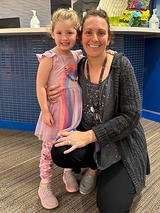
If your child is having trouble controlling their bladder or has accidents, we know how frustrating and embarrassing these problems can be. Know that you are not alone. About 20% of children over age 5 have similar issues.
The Dysfunctional Outpatient Voiding Education (DOVE) Center at Children’s Hospital of Philadelphia helps kids with these problems. Our team includes urologists, nurses, nurse practitioners and psychologists. We are one of the largest clinics in the United States dedicated to pediatric bladder and urinary tract dysfunction. Our team works together to create a plan that fits your child's needs.
What is voiding dysfunction in children?
If a child has voiding dysfunction, it means they have trouble emptying their bladder properly. This can cause problems with peeing and lead to urinary tract infections. It can be caused by physical issues or learned behaviors, but it can be treated with the help of the team in our special program.
Signs and symptoms of voiding dysfunction include:
- Daytime incontinence: Wetting accidents during the day when awake
- Nocturnal enuresis: Wetting the bed at night (bedwetting) past the age when most kids have become dry
- Urinary urgency and frequency: Frequent and urgent need to pee
- Dysuria: Pain or discomfort when peeing
- Hesitancy and straining: Difficulty starting or keeping the flow of pee going
When to seek care
If your child continues to struggle with the issues below, the DOVE Center can provide the right support and treatment.
- Continued voiding issues beyond the typical age of bladder control
- Pain or discomfort with urination
- Changes in toilet habits
- Additional symptoms such as fever, abdominal pain or constipation
- Symptoms that impact self esteem
How the DOVE Center can help

Based on your child’s evaluation, our team works together to create a plan that fits your child's needs. This may include:
- Teaching your child about their body – We help kids figure out what might be causing their accidents or symptoms so together we can find the right solution to their problem.
- Changing your child’s bathroom habits – We often suggest kids take stool softeners (medication that makes it easier to poop) to help with constipation. We also help them create a regular schedule for using the bathroom and pooping throughout the day.
- Increasing fluids – We will teach your child why drinking water is important and suggest how much water they should drink every day.
- Biofeedback training – Biofeedback helps kids learn to relax the muscles that control urination and empty their bladder completely. This can reduce accidents and urinary infections. It involves using special sensors and a computer to show how the muscles are working and teach kids how to control and strengthen them.
- Behavior modification – Our psychologist might work with you and your child to help find ways to stick to the treatment plan. They will help you both understand and overcome any problems that might make it hard to follow the plan.
- Medication – We may give kids medicine to help stop frequent urinary infections, to calm an overactive bladder or to control nighttime bedwetting.
Helpful tips for parents
- Communicate: Encourage your child to talk openly about any discomfort or worries they have about using the toilet.
- Establish a routine: Encourage your child to take regular breaks to use the toilet to help them develop healthy bathroom habits.
- Stay calm and supportive: Instead of getting mad when accidents happen, it's better to say good things and give rewards when things go well. This can help kids learn and do better.